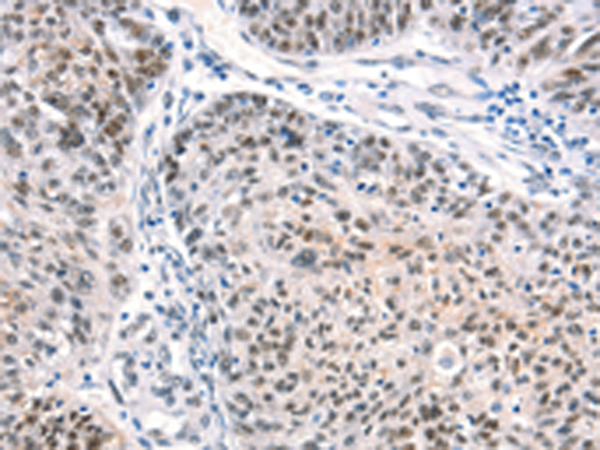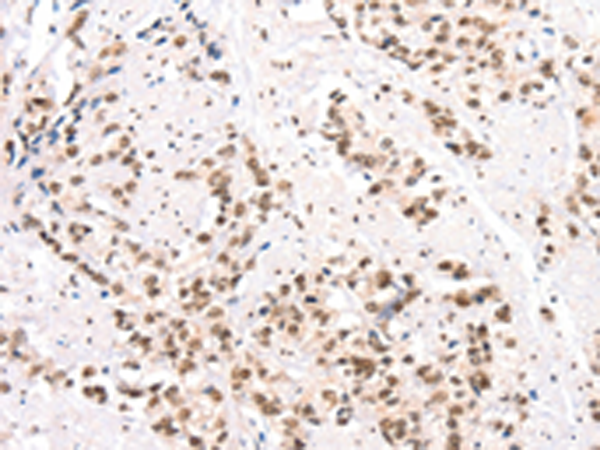


| WB | 咨询技术 | Human,Mouse,Rat |
| IF | 咨询技术 | Human,Mouse,Rat |
| IHC | 1/50-1/200 | Human,Mouse,Rat |
| ICC | 技术咨询 | Human,Mouse,Rat |
| FCM | 咨询技术 | Human,Mouse,Rat |
| Elisa | 1/2000-1/5000 | Human,Mouse,Rat |
| WB Predicted band size | 49 kDa |
| Host/Isotype | Rabbit IgG |
| Antibody Type | Primary antibody |
| Storage | Store at 4°C short term. Aliquot and store at -20°C long term. Avoid freeze/thaw cycles. |
| Species Reactivity | Human, Mouse, Rat |
| Immunogen | Synthetic peptide of human CTBP2 |
| Formulation | Purified antibody in PBS with 0.05% sodium azide and 50% glycerol. |
+ +
以下是关于CTBP2抗体的3篇参考文献,涵盖其在基因调控和疾病中的作用:
1. **"CtBP, an unconventional transcriptional corepressor in development and oncogenesis"**
- **作者**: Chinnadurai G.
- **摘要**: 该综述总结了CtBP家族蛋白(包括CTBP2)作为转录共抑制因子的功能,重点讨论了其通过招募组蛋白修饰酶(如组蛋白去乙酰化酶)调控基因表达的机制,并涉及CTBP2抗体在肿瘤相关研究中的应用(如Western blot分析)。
2. **"CtBP2 promotes tumorigenesis and progression of human colorectal cancer through activation of Wnt/β-catenin signaling"**
- **作者**: Zhang Q, et al.
- **摘要**: 研究通过免疫组化(使用CTBP2抗体)发现结直肠癌组织中CTBP2高表达,并通过实验证明其通过激活Wnt/β-catenin通路促进肿瘤侵袭,提示CTBP2可能成为治疗靶点。
3. **"The oncogenic role of CtBP2 in triple-negative breast cancer: Regulation of cell cycle and proliferation"**
- **作者**: Turner J, et al.
- **摘要**: 利用CTBP2抗体进行免疫沉淀和ChIP实验,揭示CTBP2在三阴性乳腺癌中通过抑制细胞周期抑制因子(如p21)驱动肿瘤增殖,为靶向治疗提供依据。
4. **"Structural insights into CtBP2 function in transcriptional repression"**
- **作者**: Blevins MA, et al.
- **摘要**: 通过晶体学结合抗体验证,阐明CTBP2蛋白结构与其招募E-cadherin抑制因子的关联,解释其在EMT(上皮间质转化)和转移中的调控机制。
The C-terminal binding protein 2 (CTBP2) is a transcriptional co-repressor that plays a critical role in regulating gene expression during development and oncogenesis. It belongs to the CTBP family, which includes CTBP1 and CTBP2. both sharing homology with dehydrogenase enzymes. CTBP2 interacts with diverse transcription factors (e.g., ZEB1. BCL6) and chromatin-modifying complexes (e.g., Polycomb group proteins) to repress target genes involved in apoptosis, cell adhesion, and differentiation. Its activity is modulated by NAD+/NADH levels, linking cellular metabolism to epigenetic regulation.
CTBP2 antibodies are essential tools for studying its expression, localization, and function in biological contexts. These antibodies enable detection via techniques like Western blotting, immunofluorescence, and immunohistochemistry, aiding research on CTBP2's dual roles in cancer (acting as an oncogene or tumor suppressor depending on context) and neurodevelopment. Aberrant CTBP2 expression correlates with tumor progression, metastasis, and poor prognosis in cancers such as colorectal and breast cancer. Additionally, CTBP2 splice variants exhibit tissue-specific functions, necessitating isoform-specific antibodies for precise analysis. Understanding CTBP2's regulatory networks through antibody-based assays contributes to insights into diseases and potential therapeutic targeting.
×